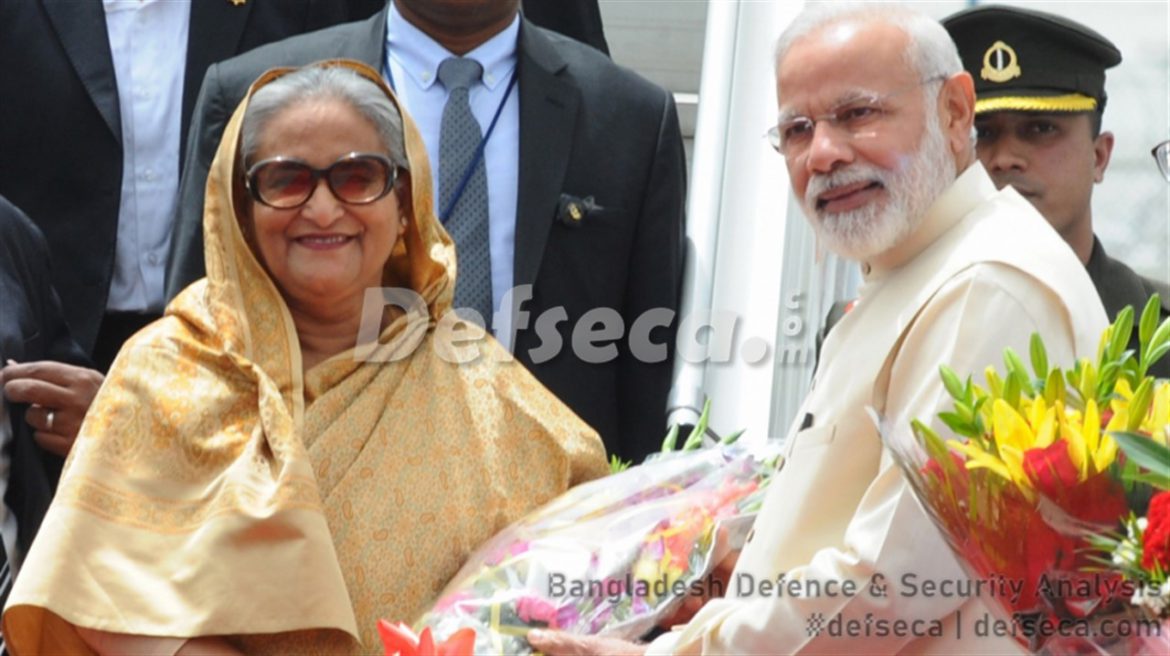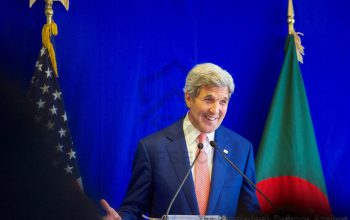The strong bilateral relations between Bangladesh and India took a nose dive as Dhaka woke up to the uncomfortable realities of the present.
Several Bangladeshi and Indian news outlets reported Prime Minister Sheikh Hasina declined to meet India’s High Commissioner to Bangladesh, H.E Riva Ganguly Das for the last couple of months despite repeated requests.
Media outlets noted all Indian projects slowed down since the re-election of Prime Minister Sheikh Hasina in 2019. However this is a complex matter that deserves a deeper explanation.
Despite Prime Minister Sheikh Hasina’s landslide victory in last year’s election the Indian government was seen less supportive of her administration, while in contrast Chinese was actively supported her government. The Awami League traditionally had strong ties with India’s National Congress party, this was apparent during Prime Minister Sheikh Hasina’s last visit. The shared connections forged in the 1971 war as well as secularist ideals serve as a strong bond between the two major political dynasties of South Asia.
It is to be noted that the BJP (India’s ruling party) campaigned strongly against Bangladesh’s interests by promoting anti-Bangladeshi rhetoric across India in sharp contrast to the Bangladesh government’s very cooperative policy with India regarding all manner of economic and security issues.
The twin threat of India’s National Register of Citizens (NRC) and the Citizenship (Amendment) Act (CAA) alarmed Bangladeshi authorities as the country has already taken in 1.2 million Muslim refugees from neighbouring Myanmar.
Dhaka was in no mind this time to add Indian Hindu and Muslim Bengali nationals to this growing list of foreigners in Bangladesh. There are already an estimated 1 million Indians living and working in Bangladesh, most of whom are undocumented workers remitting billions back to India annually.
Moreover New Delhi’s unhelpful role in the Rohingya crisis further fueled anxieties in Dhaka. Indian authorities repeatedly undermined Bangladesh’s security concerns by supplying sophisticated defence hardware including a submarine to Myanmar.
Most of the credit deals signed with India hardly ever got utilised either due to the painfully slow bureaucracy in India. Projects suffered further because of the conditions in the loans, which required Indian contractors or Indian origin equipment to be used in the projects.
Unfortunately neither the Indian contractors nor the quality of Indian made equipment imbued any confidence in Bangladesh. A good example on this can be illustrated with Indian supplied train carriages as compared to those from Indonesia. Another example is concerning hundreds of buses that were purchased by the Bangladesh government for its public commuter fleet. After operation for only a few years most of the fleet fell apart because of their shoddy quality.
The joint Bangladesh-India powerplant project near the Sundarbans region also got hampered due to the COVID-19 crisis. Indian workers were rioted and attacked Bangladeshi Police posing serious questions if Bangladesh can ever allow any India to undertake any major infrastructure projects in Bangladesh again.
India also tried to force a $500 million defence loan down in to Dhaka’s throat. This drew strong concerns within the Bangladesh military because the primary military threat to Bangladesh has always been India, with its nuclear capability and a hegemonic policy to match.
Since the signing of the Memorandum of Understanding (MoU) between the two neighbours Bangladesh did not exercise the loan option or purchase any Indian-made defence hardware despite India’s best efforts because it would hamper Bangladesh’s own national security.
The continued killings of Bangladeshi civilians on the frontier has also bred anger in Bangladesh. Citizens expect the Bangladeshi government to act resolutely to protect Bangladeshi lives and property against the BSF.
Earlier this month Bangladesh’s Foreign Minister AK Abdul Momen cautioned India’s Border Security Force (BSF) against Bangladeshis. He hinted at the measures being taken up by Dhaka to boost the capabilities of the Border Guard Bangladesh (BGB) to counter the Indian BSF’s barbaric acts.
Regarded as Bangladesh’s first line of defence the BGB is almost entirely equipped with Chinese weapons. Though helicopters and vehicles are mostly imported from Russia, Japan and the US.
Another critical sign of the waning ties is Bangladesh’s numbing silence over the Sino-Indian border clashes that occurred in last June. An Indian Army colonel was beaten to death and several other Indian officers were caught after they attacked a Chinese construction workers camp.
None of India’s neighbours were supportive of India’s misadventures with China.
But now it seems India has been outplayed and encircled in what it viewed as its own backyard by China mostly because of its miscalculated actions.
India also banned export of onions hurting Bangladeshi households. Pakistan came to the rescue supplying thousands of tonnes of onions. This marked the first time Bangladesh imported any agricultural products from Pakistan in the last 15 years.
Imran Khan also took it upon himself to improve ties with Bangladesh after a period of cold relations.
Prime Minister Sheikh Hasina hanged pro-Pakistani war criminals in Bangladesh. This drew widespread condemnation in Pakistan. Bangladesh retaliated by not accepting a Pakistani High Commissioner to Bangladesh. It forced Pakistan to come up with another diplomat after 20 months. Dhaka accepted and since the beginning of this year the relations between the two countries started improving markedly.
Pakistan’s Prime Minister also called his Bangladeshi counterpart. He commended Sheikh Hasina’s leadership and hoped for increasing cooperation with Bangladesh.
Prime Minister Sheikh Hasina being the experienced statesperson she is might be trying to use the ties with Pakistan and China as a powerful bargaining chip with India full knowing how the Indian mind works.
There is very little India can do if China and Pakistan focus on jointly improving ties with Bangladesh. The three countries know that together they can force the Indian bullies to behave themselves in the region.
At the end it seems India’s right-wing leader, Narendra Modi only dug India deeper in to trouble. It’s a lesson that extremism never pays off in the long run.
Without a wholesale improvement in India’s policies and actions concerning its neighbours, India as a country is headed for pariah status as far as the neighbourhood is concerned. It is on the way to become fully replaced by mighty China. A country that literally beat India without using a bullet.




